Mendocino Woodlands Camp Two Cabins, CA 2024
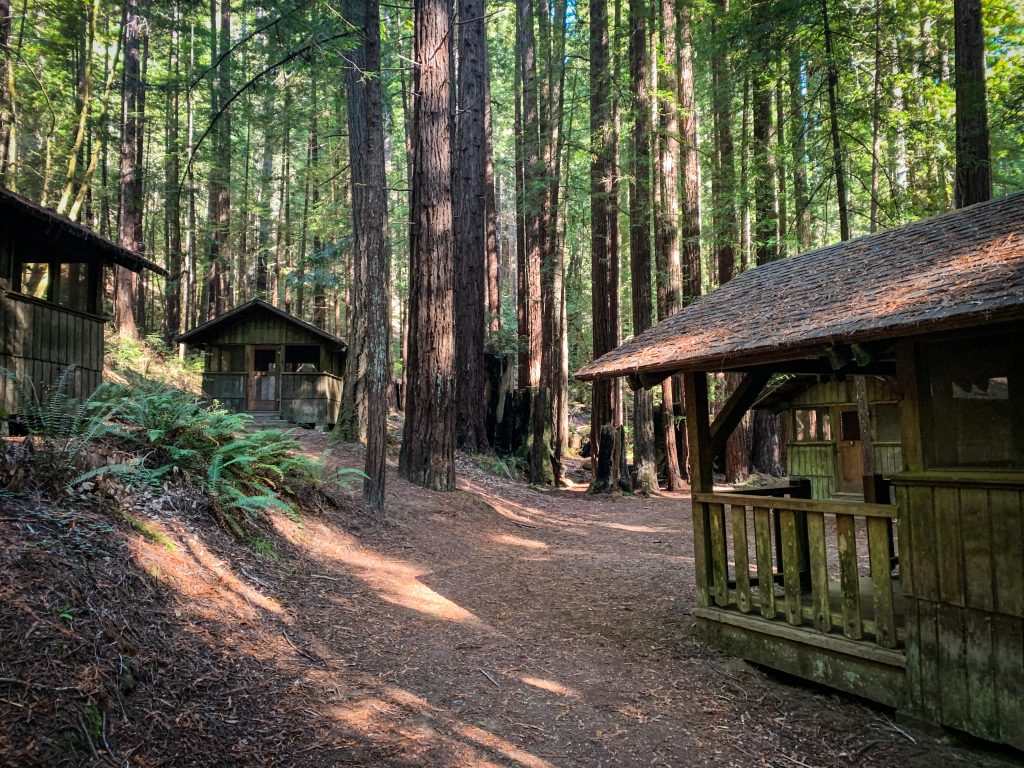
We’re heading back to Mendocino Woodlands State Park!
PROJECT PARTNER: Mendocino Woodlands Camp Association
SESSION DATES: September 29 – October 4, October 6-11, and October 13-18 (Session 2 will work alongside a YCC crew, have a lower volunteer cap, and no Kitchen Helper assigned)
PROJECT SUPERVISOR: Aric Smejkal
CREW LEADER: TBD!
Project Site Description & History
Built by the Works Progress Administration and the Civilian Conservation Corps in the 1930’s as a Recreation Demonstration Area, the Mendocino Woodlands State Park was established to introduce the public to the wonders of nature through recreation and conservation. The campgrounds were created to retire submarginal agricultural and other lands, and repurpose them for recreational use. The entire park has continued to serve this original purpose without interruption since opening in 1938. The Mendocino Woodlands State Park is located within the traditional Pomo Indian territory, near the village site of bu’ldam.
Mendocino Woodlands is the largest and most intact state park development undertaken by the Recreation Demonstration Area. Camp One opened at Mendocino Woodlands in 1938. Construction continued, however, on dozens of buildings. Water and sewage systems were under construction, as was a telephone system, swimming facilities, foot bridges, and “landscape naturalization” around the completed construction projects. By 1943, all three group camps had been completed.
Originally, the Woodlands consisted of 5,425 acres. In 1976, Senate Bill 1063 split that parcel of land, reducing the camp to approximately 700 acres in a narrow corridor along the river, and transferred it to the State Department of Parks and Recreation. Since 1949, the Mendocino Woodlands Camp Association, a 501(c)(3) non-profit public-benefit organization, has managed and maintained the park and facilities.
In 1997, the Mendocino Woodlands was honored to become the first Recreation Demonstration Area within the California State Park system to receive National Historic Landmark status due to the exceptional architectural value of the structures as well as the site’s incredible significance as part of the history of the United States. Join HistoriCorps this Fall for our return voyage to Camp Two Cabins following 2023’s successful restoration efforts and notable volunteer turnout!
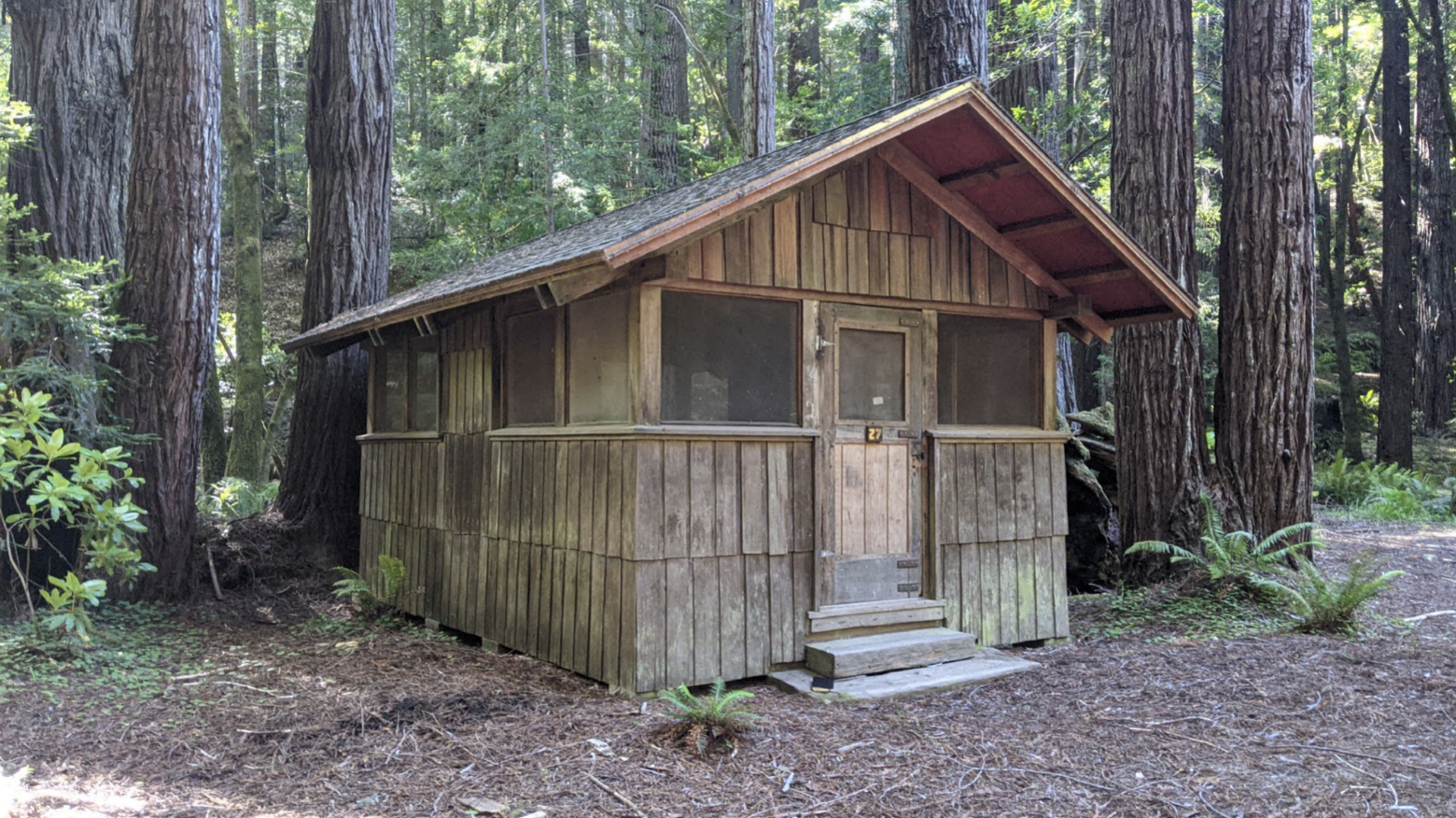
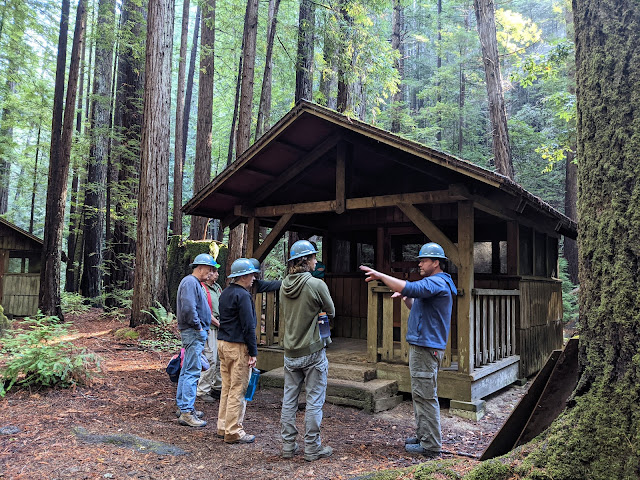
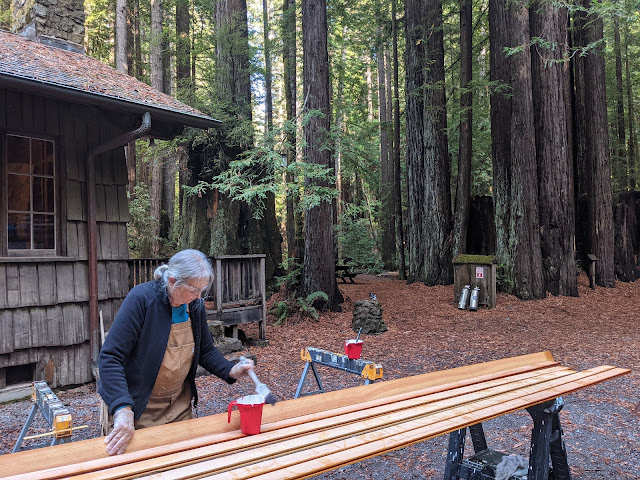

Location and Logistics
SESSION DATES: September 29 – October 4, October 6-11, and October 13-18
Please plan to arrive at the campsite no earlier than 5pm and no later than 7pm on the first day of your session.
LOCATION: Located about 110 miles north of Santa Rosa, CA.
ACCESS: ![]()
![]()
![]()
![]()
![]()

![]()
Our partners at the Mendocino Woodlands Camp Association have offered us room and board at the illustrious Camp 2 Cabins! We highly encourage you to stay in with us in these accommodations for this project. Showers will be available, but please bring your own bedding!
Alternatively, only truck-campers, campervans, and trailers or RVs up to 25ft will have access to our campground. Tent camping and hookups are not available and dogs are not allowed.
WEATHER: Anticipate highs in the 70s and lows in the 40s. Weather conditions may be rainy, cloudy, or sunny. Volunteers are responsible for checking weather conditions before their session begins, and packing appropriately.
Scope of Work
HistoriCorps is committed to educating and training volunteers in preservation skills, with an overarching mission of inspiring a preservation ethic in all those involved. Learning and working alongside expert HistoriCorps field staff, volunteers and applying the traditional skills necessary to restore the Mendocino Woodlands State Park Camp Two Cabins:
- Replace deteriorated front porch and cabin interior flooring in-kind using vertical grain 1×4 tongue and groove Doug fir flooring
- Coat all sides of new flooring with borate preservative and a clear, water–based finish
- Replace deteriorated redwood front porch steps in-kind
- Repair and or replace deteriorated floor joists as needed.
- Replace deteriorated redwood trim around porches in-kind
- Remove built–up organic material along base of uphill-facing cabin walls
- Level cabins using wood beams and jacks; replace redwood foundation blocks as necessary
- Selectively replace deteriorated shake siding in-kind (redwood if available)
- Patch damaged plywood roof sheathing in-kind using similar appearance-grade material; finish to match existing
Please note: Tasks vary by day and by week, depending on a variety of factors including: weather, project priorities, previous groups’ work, and more. Though it is likely you will get to learn and practice most or all of the above tasks, it is not guaranteed. The higher percentage of the scope a particular task is, the more likely you will get to practice it.
Sign Up!
We’re thrilled this project has inspired you to volunteer!
CLICK HERE TO REGISTER!
Visit our Job Calendar to see spaces are available!
*All registrations submitted to projects at capacity will be automatically added to our waitlist.*
CANCELLATIONS effect our ability to complete projects. Please register only if you are certain about your ability to participate.
You will know your registration was successful when you receive a confirmation email. Contact volunteer@historicorps.org for assistance.
HistoriCorps does not charge for its volunteering projects. HistoriCorps relies on donations to continue engaging volunteers to save significant historical sites across America for generations to come. Your donation of any amount will make an incredible difference! Increase your impact – make a generous gift today.
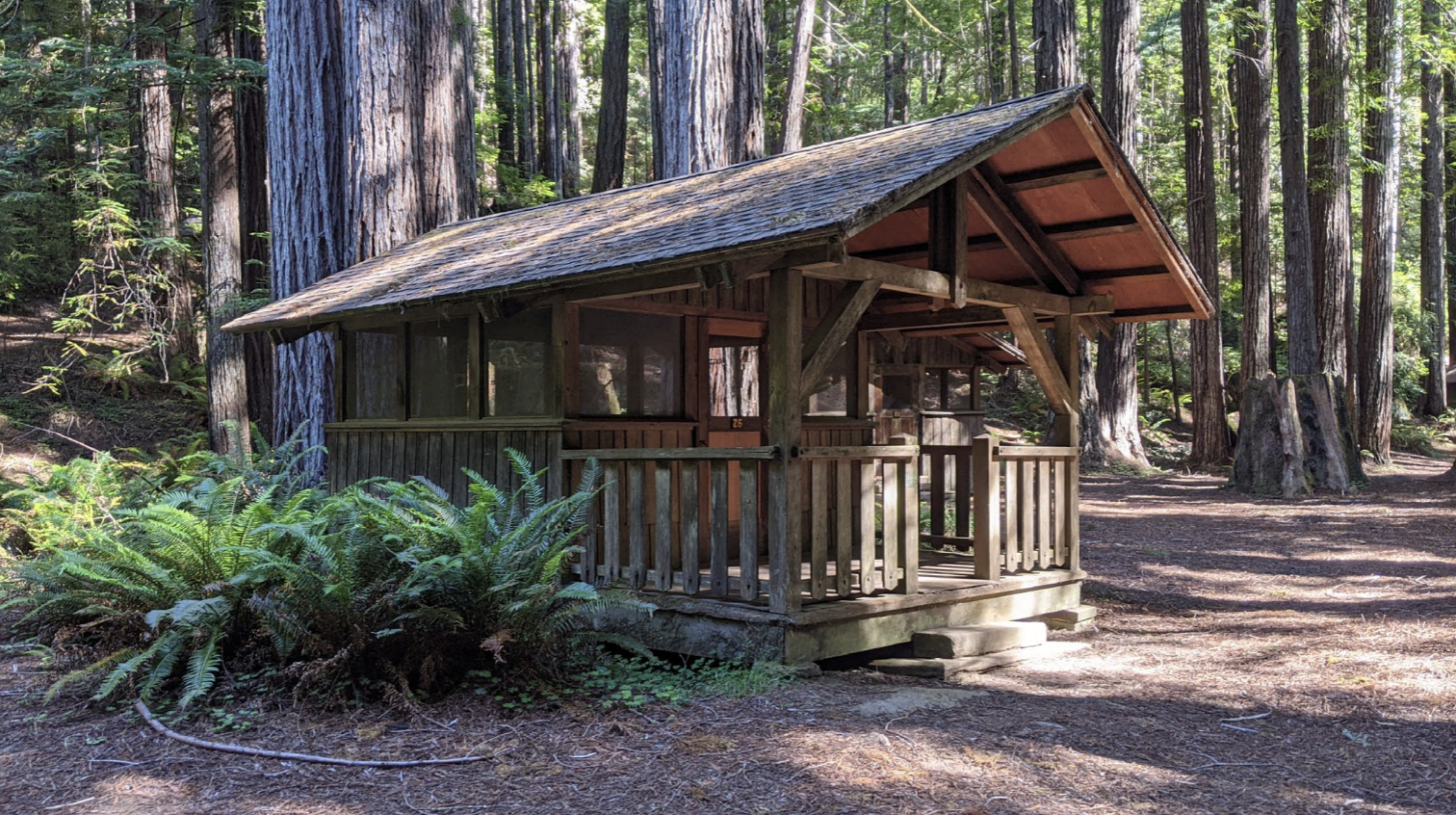
Volunteer Logistics, Policies, and Advice
We’re so glad you’re interested in joining this project! If you’re new to our community, review the Volunteer FAQ first! Please note the following logistics and policies:
- Volunteering with HistoriCorps is free! We will provide all meals, tools, training, equipment, and a campsite or shared indoor lodging. Dinner is not provided on the first night.
- Volunteers are responsible for bringing their own gear, work gloves, sturdy work clothes and boots, and appropriate sleeping equipment. Check the average temperatures before you start packing – the nights and mornings may be colder than you anticipate! Then, read this advice about how to stay warm when tent camping in colder places.
- Campsite accessibility varies by project. Some projects can accommodate tents only; others can accommodate small RVs. Please review the project site description above for more information, and if you’re still not sure, email volunteer@historicorps.org for help.
- If this project does not offer showers, you might want to consider bringing a solar shower or research other methods to clean up after the work day.
- Volunteer crew sizes generally range from 4-8 volunteers, with two HistoriCorps staff that lead and train volunteers in the work.
- Safety is one of HistoriCorps’ top priorities, and volunteers can contribute to a safe working environment by ensuring their physical fitness is adequate for the work. See above for this project’s scope of work and difficulty level. Please, call us if you are not quite sure if a project is a good fit for your skills or fitness level. We may be able to suggest a project more suitable and enjoyable for you.
- Hard hats, eye protection, ear protection, gloves are standard personal protection equipment (PPE) required on all projects. Hard hats must be worn at all times on the project site, unless working in a designated safe space. Field staff will train volunteers on correct use of PPE.
- Dogs are generally allowed to accompany their humans in project campsites (actually, we love having dogs join us around the campfire!). Dogs are not permitted on the job site for everyone's safety. HOWEVER: HistoriCorps also follows the rules and regulations of our project partner. If the project partner does not permit dogs onsite then HistoriCorps is no exception. Please ask HistoriCorps or the project partner directly if you have any questions about whether Fido is welcome.
